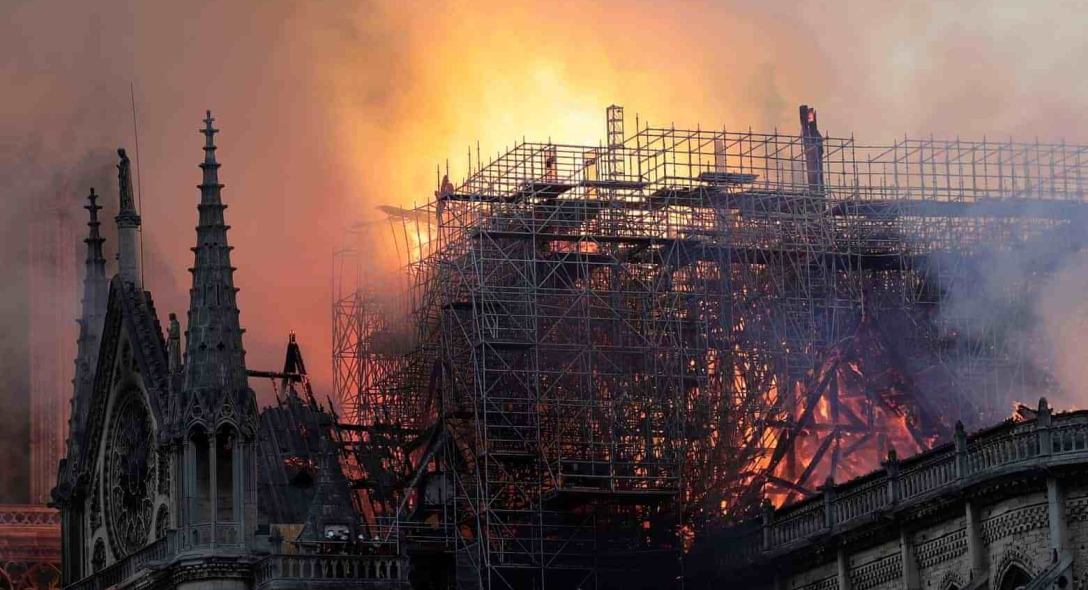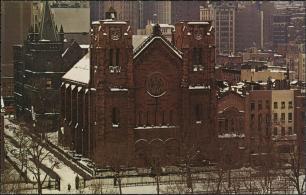Sermon preached at Christ Church
Greenwich, Connecticut
June 23, 2019 / Second Sunday after Pentecost
Luke 8:26-39
I’d like you to think for a minute about a time when you went out for lunch or dinner and had a great meal. Where were you? What did you eat? How was it cooked? Whom were you with? What made it great?
I will confess that one of the best meals that I have ever had consisted of a peanut butter and jelly sandwich. What made it great was that as a 13-year old I had carried this precious meal up the side of a mountain, and I unwrapped it surrounded by the glories of creation, under a clear sky and warm sun, and I ate it at the top of the world. Nothing ever tasted so good.
Research suggests that up to 50% of diners’ perception of the quality of the food that they are served in restaurants is affected by the surroundings: the lighting, the décor, the solicitousness of the staff, and all the other intangibles of the dining experience. Strictly speaking, a restaurant could make the greatest Dover sole or filet of beef in the history of the world, but if presented by a surly staff on poor china and under harsh lighting, not only would a Michelin star be withheld, but – more importantly – it wouldn’t taste as good as worse food in more sophisticated surroundings. This is why restaurants spend so much on interior design, from the most down-home barbecue pit to a palace of haute cuisine.
What this tells us is that the disposition of the person who easts a meal matters a great deal.
This past Thursday was the feast of Corpus Christi, when since the 13th century the Western church has set aside a particular day to meditate on the memorial that Christ has commanded us to make in the sacrament of his body and blood. The history of Christianity is littered with conflict over the exact mechanics of what happens at the altar, what happens to the bread and the wine when consecrated. The great body of the ignorant – both Christian and pagan alike – are shockingly well versed in the terms of those debates, probably since transubstantiation is a funny word that tends to stick in the mind. But I fear that too much attention to the bread and wine themselves has tended to obscure the purpose of what we do on Sundays, and that misplaced attention leaves us high and dry concerning whether and why any of this even matters.
Those of you who have been well catechized will know the technical definition of a sacrament: it is an “outward and visible sign of an inward and spiritual grace.” The sacrament of Holy Communion – of the bread and the wine – is not an end unto itself, nor does it work mechanistically, like a spiritual protein bar, something you can shove into your mouth whilst running to catch the train.
Communion is a means by which we encounter the living Christ, and like a person sitting down to any meal, the attention with which the meal is eaten matters a great deal, whether that meal is in all simplicity (like the 8 am service) or slightly more elaborate (like the 10 am). The disposition of the diner is important. The shape of the Sunday morning service is an aid to the correct disposition: we are put in mind of God’s saving deeds in Scripture; we say our prayers; we – importantly! – confess our trespasses against God and our neighbor; having confessed, we are able to share the peace of Christ with our neighbors. Having done these things, we may come to the altar rail, devoutly kneeling.
Some years ago, while flipping through the Prayer Book during a particularly long and boring sermon, I came across a lovely prayer, which I had never heard before. For those of you flipping through the Prayer Book during this sermon, it is on page 834. Here is what it says:
O Lord Jesus Christ, who in a wonderful Sacrament hast left unto us a memorial of thy passion: Grant us, we beseech thee, so to venerate the sacred mysteries of thy Body and Blood, that we may ever perceive within ourselves the fruit of thy redemption…
That prayer tells us everything about what Communion is, what its purpose is, and why it is not just a token of membership in a club called the church. For those who come to this altar in faith, the sacrament forms part of the means by which we may be spiritually renewed, and our lives changed for the better.
St Paul writes, “Do not be conformed to this world but be transformed by the renewal of your mind.”[1] That is what we are doing here. It is only by this renewal in Christ that we may hope to find the transformation we seek, the transformation that we hope to bring to the world by means of – as Paul also writes – “the fragrance that comes from knowing Christ.”[2]
In this morning’s lesson from the Gospel of Luke, we hear what it looks like when a person is transformed by an encounter with the living God. The Gerasene demoniac is healed by Jesus, and the demons that had possessed him are shown to be viciously suicidal when entered into a herd of pigs. After the man’s ordeal is over, he is sitting at Our Lord’s feet, and some people come out to see him. Do you remember what their response was? They were afraid. Of course they were. An encounter with a person saved by Christ is unsettling and unnerving. I remember as a college sophomore being paired for a class project with probably the prettiest girl in the class. Meeting in one of the coffee shops to coordinate our work, we were chatting amiably, and I – in all of my smug worldly wisdom – made a flippant comment about evangelical Christians.
“I’m an evangelical Christian,” she said plainly. She wasn’t upset or offended. She didn’t tell me off. It was unnerving, and it is still unnerving, because she was no Bible thumper; she was composed and kind and her utter unflappability unmasked my knowing condescension as so much hot air. She had the daily assurance of the living presence of the risen Christ, and next to that, all the rest of it was just noise. The joke’s really on me, though. She’s now a lawyer in Washington, and I’m up in this pulpit, preaching, an evangelical Christian in the most literal way.
When we come to this Holy Table, with a bit of fear and trembling but really with devotion and kindness and humility in our hearts, God opens the path by which Christ may drive out the demons of conceit and self-absorption and make room for charity and mercy, thus remaking our lives, and through our lives, remaking the world. It may be an unsettling experience for us, and for those around us, “declaring how much God has done for you,” but it has the power to send demons scampering to their destruction.
Let us pray that, through our worthy reception of the Sacrament of Christ’s body and blood this day, we may ever perceive within ourselves the fruit of his redemption, and show forth his glory in our lives, now and always.
AMEN.










